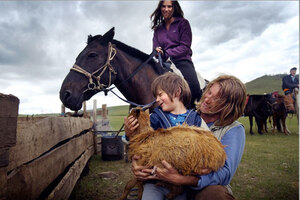Family finds healing in an unexpected way
When a child has a condition and modern medicine offers no relief, some parents turn to faith. Others turn to natural healing. When the Isaacsons discovered their autistic son had a connection with horses, they did both.
The documentary The Horse Boy follows the Isaacsons through Mongolia to visit shaman healers. Although the film has directional flaws, the story is a moving, miraculous look at nature and spirituality.

Horsing around · The Horse Boy follows the Isaacsons’ struggle to raise their autistic son, Rowan. The family travels to Mongolia, where Rowan meets shaman healers and discovers his connection with horses. - Photo courtesy of Justin Jin
Science still does not fully understand autism, but its symptoms are all too real. At 5 years old, Rowan Isaacson has hysterical tantrums, obsessive fixations and no toilet training. His parents, Rupert Isaacson, a former journalist and horse trainer, and Kristin Neff, a psychology professor, feel their lives slipping away into their son’s inconsolable condition.
This is until Rupert discovers the one thing that brings Rowan peace — the neighbor’s gentle old mare. Already fascinated by shamanic healing, he finds the one country where horses and shamanism intersect: Mongolia.
Finding no help in modern medicine or psychology, the Isaacsons plunge into the wilds of the Mongolian steppes, travelling on horseback from shaman to shaman, a local guide as their only link to the natives. Their unbelievable journey changed their lives forever.
Commentary from autism experts pepper the moments not involving shamanic rituals and family drama. Apparently, heavy metals, pesticides and divine destiny all cause autism. Although the expert commentary is interesting, it is not incorporated into the film as well as it could be.
The shamans the family visits give the film a unique spiritual aspect. The film does not explain the nuances of the ceremonies beyond their basis in ancestral spirits, but this choice gives some pleasing mystery to the film. Whether it is holistic healing or fresh Mongolian air, something happens to Rowan. It is fascinating to watch his gradual change, such as when he plays with the guide’s young son.
The Isaacsons are very real and empathetic. Rupert’s mix of sarcasm and hope ease the grind of raising an autistic son, such as tantrums stifled by “Code Brown” toilet humor.
Kristin is not as interesting, but her willingness to throw everything aside, follow her husband into the steppes and participate in shamanic rituals makes her very admirable.
But Rowan is easily the most interesting force of the movie.
Whether in an inconsolable rage or playing with a reindeer, infinite possibility hides behind his big blue eyes. One feels the boy has constructed entire kingdoms for when he disappears inside himself. His connection with animals — rabbits act like stuffed animals in his arms — is fascinating to behold.
The camera is very good at catching the intricacies of Rowan, and the intimacy of the shamanic rituals. Never domineering but always sensitive to tone, director Michel Orion Scott has a very clear understanding of what makes the Isaacson’s story one worth telling. A score by Kim Carroll and Lili Haydn is pleasant accompaniment.
Although The Horse Boy delivers a gripping story, it has a few problems.
The interjections by autism experts do little to contribute to the story and distract the film’s focus. If the director wanted to analyze the effects of autism more, he should have just gone for it instead of peppering the story.
Scott is new to documentaries, and it shows. While he captures many powerful moments, the space between them can resemble a slog through a Mongolian rainstorm. Cranky Rowan and muddy hills are effective the first few times, but grow stale.
The film’s pace slips further in the final third, which weakens the miraculous nature of the film’s climax. The resolution, while fascinating to behold, carries an all-too-sweet taste that does not quite go away when the credits roll. It needed a more deft hand and came up a little short.
Despite suffering from editorial choices, the film’s core — this love-bound, weary-but-still-hopeful family — remains a driving force throughout the film.
The Horse Boy offers a penetrating look into the life of a family with a troubled child. It is not a story of autism, a story of horses or even a story of natural healing, but a combination of all three that delivers a unique portrait of a very special boy.
